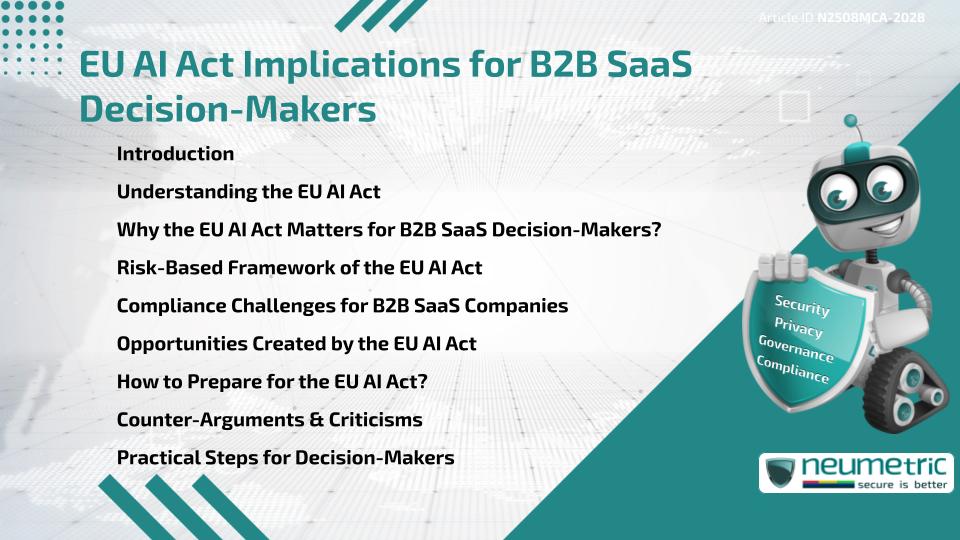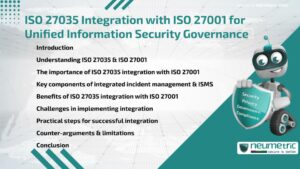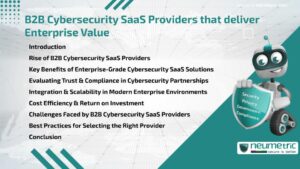Table of Contents
ToggleIntroduction
The European Union Artificial Intelligence Act, better known as the EU AI Act, is the world’s first major attempt to regulate Artificial Intelligence in a structured & enforceable way. For B2B SaaS decision-makers, understanding eu ai act implications is critical because the law impacts how AI-driven services are built, deployed & managed. The Act introduces a Risk-based Framework, mandates Compliance Requirements & creates both challenges & opportunities for businesses operating in or serving the European market. This article explores the key aspects of the EU AI Act, why it matters for B2B SaaS leaders, the compliance hurdles & actionable steps to prepare.
Understanding the EU AI Act
The EU AI Act was introduced to ensure that Artificial Intelligence systems are safe, transparent & aligned with fundamental rights. Unlike earlier technology regulations, the Act does not take a one-size-fits-all approach. Instead, it categorizes AI applications into four levels of Risk: minimal, limited, high & unacceptable.
Minimal-Risk AI applications include chatbots & recommendation systems. High-Risk AI Systems, such as those used in recruitment or Healthcare, are subject to strict obligations. Unacceptable-Risk systems, such as those involving manipulative practices, are banned altogether.
This layered approach helps regulate AI without stifling innovation but it places significant responsibilities on providers, particularly B2B SaaS businesses offering AI-powered services.
Why the EU AI Act Matters for B2B SaaS Decision-Makers?
B2B SaaS decision-makers must take eu ai act implications seriously because compliance determines market access in the European Union. Companies offering AI-powered SaaS products that fall under high-Risk categories will need to meet strict requirements related to transparency, documentation & human oversight.
Even businesses outside the EU are affected if their SaaS products are used by European clients. This extraterritorial reach makes the Act especially relevant for global SaaS Providers.
Risk-Based Framework of the EU AI Act
At the heart of the Act lies its Risk-based Framework. High-Risk applications include systems used in credit scoring, Employee monitoring & public services. These categories demand comprehensive conformity assessments, logging requirements & ongoing monitoring.
For SaaS companies, this means any AI feature integrated into their platform must be assessed against the Act’s criteria. For example, an HR SaaS tool with automated candidate ranking could be classified as high-Risk, triggering stricter compliance duties.
Compliance Challenges for B2B SaaS Companies
Compliance with the EU AI Act is far from straightforward. Some of the main challenges include:
- Technical documentation: Companies must maintain detailed records of training data, system design & intended use.
- Transparency obligations: End-users must be informed whenever they are interacting with an AI System.
- Data Governance: Training datasets must meet strict quality & non-discrimination standards.
- Audit & monitoring: Continuous evaluation of AI Performance is required.
These challenges can be costly & time-consuming, particularly for startups & mid-sized SaaS Providers with limited compliance budgets.
Opportunities Created by the EU AI Act
While compliance may seem like a burden, the Act also creates opportunities. Businesses that comply early can position themselves as trustworthy providers in a competitive market. Strong Governance frameworks & transparent AI Practices can become selling points for enterprise clients concerned with Risk Management.
For example, SaaS Providers that embed compliance into their product design may find it easier to win contracts with regulated industries like Finance & Healthcare, where trust is paramount.
How to Prepare for the EU AI Act?
Decision-makers should start preparing now by:
- Conducting Risk Assessments of all AI Systems within their SaaS platform.
- Establishing compliance roadmaps that align with the Risk categories defined in the Act.
- Investing in explainable AI tools that make transparency easier to implement.
- Training staff on the legal & ethical requirements of AI.
- Engaging with regulators & industry groups to stay updated.
Proactive preparation not only reduces legal Risk but also positions SaaS firms for growth under the new regulatory environment.
Counter-Arguments & Criticisms
Critics argue that the EU AI Act may slow down innovation by creating compliance overheads. Some claim that startups may be disproportionately affected compared to larger players with dedicated compliance teams. Others suggest that the definitions of high-Risk applications are too broad, leaving companies uncertain about their obligations.
However, supporters point out that the Act balances safety & innovation. By introducing clear rules, it reduces legal ambiguity & builds trust in AI adoption.
Practical Steps for Decision-Makers
To navigate eu ai act implications effectively, B2B SaaS decision-makers should:
- Audit all AI features against the Act’s Risk categories.
- Develop compliance documentation early.
- Partner with legal & technical experts.
- prioritise transparency features within their platforms.
- Treat compliance as part of the value proposition, not just a legal requirement.
These steps ensure that businesses remain competitive while meeting regulatory demands.
Takeaways
The eu ai act implications for B2B SaaS decision-makers extend beyond legal compliance. The Act reshapes how SaaS companies design, deploy & manage AI-driven services. While challenges such as documentation & monitoring exist, the opportunities for trust-building & competitive advantage are equally strong. Proactive preparation is the best strategy for navigating this regulatory shift.
FAQ
What is the EU AI Act?
The EU AI Act is a European law regulating Artificial Intelligence systems based on their Risk levels, ensuring Transparency & Accountability.
Who does the EU AI Act apply to?
It applies to companies that develop, deploy or market AI Systems in the European Union, even if the provider is based outside the EU.
How does the Act affect B2B SaaS companies?
B2B SaaS companies offering AI features may need to comply with documentation, transparency & monitoring requirements depending on Risk levels.
What are high-Risk AI applications under the Act?
B2B SaaS companies offering AI features may need to comply with documentation, transparency & monitoring requirements depending on Risk levels.
Do SaaS startups face higher compliance costs?
Yes, startups may face resource challenges, but compliance can also differentiate them positively in the market.
Can companies outside the EU ignore the Act?
No, the Act has extraterritorial reach, meaning non-EU companies serving EU clients must comply.
How can SaaS firms prepare for compliance?
By conducting Risk Assessments, maintaining documentation, training staff & embedding transparency into their AI Systems.
Need help for Security, Privacy, Governance & VAPT?
Neumetric provides organisations the necessary help to achieve their Cybersecurity, Compliance, Governance, Privacy, Certifications & Pentesting needs.
Organisations & Businesses, specifically those which provide SaaS & AI Solutions in the Fintech, BFSI & other regulated sectors, usually need a Cybersecurity Partner for meeting & maintaining the ongoing Security & Privacy needs & requirements of their Enterprise Clients & Privacy conscious Customers.
SOC 2, ISO 27001, ISO 42001, NIST, HIPAA, HECVAT, EU GDPR are some of the Frameworks that are served by Fusion – a SaaS, multimodular, multitenant, centralised, automated, Cybersecurity & Compliance Management system.
Neumetric also provides Expert Services for technical security which covers VAPT for Web Applications, APIs, iOS & Android Mobile Apps, Security Testing for AWS & other Cloud Environments & Cloud Infrastructure & other similar scopes.
Reach out to us by Email or filling out the Contact Form…





